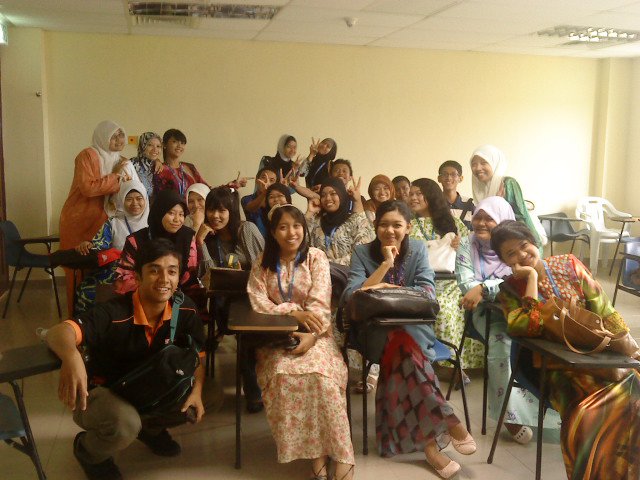Sunday, April 17, 2011
Bruno Mars - Grenade [Official Music Video]
Posted by Muhammad Kamarulazwan at Sunday, April 17, 2011 0 comments
Monday, January 17, 2011
Introduce my partner

~NOUNS~
| Definition: A noun is a word used to refer to people, animals, objects, substances, states, events and feelings. Nouns can be a subject or an object of a verb, can be modified by an adjective and can take an article or determiner. For example:
Nouns also denote abstract and intangible concepts. For example:
Noun Plurals For exaample:
When the singular noun ends in: -sh, -ch, -s, -ss, -x, -o we form their plural form by adding "-es". For exaample:
When the singular noun ends in "y", we change the "y" for "i" and then add "-es" to form the plural form. But do not change the "y" for "ies" to form the plural when the singular noun ends in "y" preceded by a vowel. For exaample:
However, there are many Irregular Nouns which do not form the plural in this way: For exaample:
Nouns may take an " 's " ("apostrophe s") or "Genitive marker" to indicatepossession. If the noun already has an -s ending to mark the plural, then the genitive marker appears only as an apostrophe after the plural form. For example:
The genitive marker should not be confused with the " 's " form of contracted verbs, as in John's a good student = John is a good student. Noun Gender For example:
Types of Nouns
|
PRE~WRITING LANGUAGE
Your professor has just given you an assignment. You are required to write a paper about a specific topic, or to come up with a topic of your own. You begin to panic. "Where do I start?" you may ask yourself. "How do I begin?"
First of all, take a deep breath and relax. You can do this! Aside from maintaining a positive attitude, here are a couple of ideas you can use to get yourself organized. Keep in mind that the following techniques and advice can be useful for both research papers and regular essays.
Prewriting techniques
The following procedures help you to unlock your memory and to associate your ideas with other experiences and recollections in order to come up with a workable and interesting paper topic. Three such activities involve directed questioning, freewriting, and brainstorming. You may not need to use all three, but you should acquaint yourself with each activity to find one that is most productive for you.
Directed Questioning
If you already have a topic that interests you but are not sure how to approach it, try directed questioning. Rather than encouraging you to expand your thinking, this method helps you to narrow your broad ideas. These questions may prove helpful:
How can I describe the topic? How can I define the topic? How does the topic resemble or differ form other topics? How does the topic work? How does the topic affect other things? Can I argue for or against the topic? Why does this topic interest me? What ideas are generally associated with the topic?
Freewriting
Many people find that they can bring ideas for developing a topic to the surface through freewriting, a strategy designed to "free" ideas from your subconscious mind and get them down on paper. This kind of writing is "free" in another sense; you don't need to worry about punctuation, correct grammar usage, etc. Your main objective is to write for a sustained period of time (ten to fifteen minutes) without stopping.
Freewriting can be open or focused. If you really do not have any idea what to write about, just begin to write down your impressions and thoughts in an "open" freewrite. Filling the page with words may coax something from your mind. Once you have done this, choose an idea or two from your open freewrite to explore in a more "focused" freewrite. Writing down your thoughts about a more specific idea that came up in your open freewrite will narrow down your topic even more, and hopefully will lead to the idea that will be the basis for your paper.
If you get stuck while you are freewriting and can not think of anything else to write, write the same word over and over again until you can think of something to write. This way you will not break your train of thought.
Brainstorming
Another way to get ideas down on paper quickly is through brainstorming Start with a significant word or phrase, and try to record everything that comes to your mind. If you reach a point where you can no longer come up with any new ideas, ask a friend to help you brainstorm some fresh topics.
After you have finished brainstorming, take a look at the material you have generated. What items seem to go together? What further connections can you see? What ideas and terms do you want to develop? What idea or concept seems to dominate your list? What material is surprising? You may decide to use most of the items you produced, or you may find only a few fragments to keep. However, one of these fragments may point the way to a good paper.
~ADVERB~
An adverb can modify a verb, an adjective, another adverb, a phrase, or a clause. An adverb indicates manner, time, place, cause, or degree and answers questions such as "how," "when," "where," "how much".
While some adverbs can be identified by their characteristic "ly" suffix, most of them must be identified by untangling the grammatical relationships within the sentence or clause as a whole. Unlike an adjective, an adverb can be found in various places within the sentence.
In the following examples, each of the highlighted words is an adverb:
- The seamstress quickly made the mourning clothes.
In this sentence, the adverb "quickly" modifies the verb "made" and indicates in what manner (or how fast) the clothing was constructed.
- The midwives waited patiently through a long labour.
Similarly in this sentence, the adverb "patiently" modifies the verb "waited" and describes the manner in which the midwives waited.
- The boldly spoken words would return to haunt the rebel.
In this sentence the adverb "boldly" modifies the adjective "spoken."
- We urged him to dial the number more expeditiously.
Here the adverb "more" modifies the adverb "expeditiously."
- Unfortunately, the bank closed at three today.
In this example, the adverb "unfortunately" modifies the entire sentence.


 .
. 
